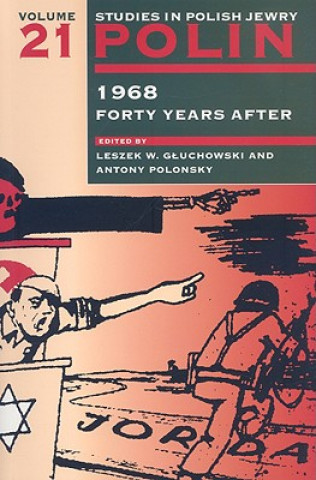
Versand
Kaufberater





Passt nicht? Macht nichts! Bei uns ist die Rückgabe innerhalb von 30 Tagen möglich
 Geschenkgutschein
In einem beliebigen Wert
Geschenkgutschein
In einem beliebigen Wert
Mit einem Geschenkgutschein können Sie nichts falsch machen. Der Beschenkte kann sich im Tausch gegen einen Geschenkgutschein etwas aus unserem Sortiment aussuchen.
Polin: Studies in Polish Jewry Volume 21
 Englisch
Englisch
 136 b
136 b
30 Tage für die Rückgabe der Ware
Das könnte Sie auch interessieren


In the mid-1960s, public opinion in Poland turned against the Gomulka regime for a variety of reasons. In an attempt to regain public support and divert attention from the real problems, Gomulka adopted an antisemitic stance. On 19 March 1968 he delivered a speech to party activists in which he divided Jews into three categories: 'patriotic Jews', 'Zionists', and those who were neither Jews nor Poles but 'cosmopolitans', who should 'avoid those fields of work where the affirmation of nationality is indispensable'. In consequence, nearly 15,000 Jews--a very large part of Poland's Jewish community--left for Israel, western Europe, and North America, effectively ending Jewish life in the country for over a decade. The events of 1968 were long ignored by scholars but in recent years their importance in the process which led to the collapse of communism has become increasingly evident. This volume illuminates the events that triggered the crisis, the crisis itself, and its consequences. Different aspects of this are examined by Dariusz Stola, Jerzy Eisler, and Wlodzimierz Rozenbaum, while the role of the the Polish Military Intelligence Service during 1945-1961 in precipitating the crisis is analyzed by Leszek Gluchowski. Several contributors consider the background to the crisis in terms of the concerns of the Jewish community. Audrey Kichelewski describes developments in the community between the consolidation of Gomulka's power in 1957 and the outbreak of the Six Day War. Malgorzata Melchior examines how Jews who had survived in Poland during the Second World War responded to the crisis. Joanna Wiszniewicz provides a group portrait of pupils of Jewish origin in Warsaw schools in the 1960s, a milieu from which important elements in the student opposition were drawn. Karen Auerbach sharpens the focus in her consideration of the situation of Yiddish writer Naftali Herts Kon, while Holly Levitsky describes the travails of the Jewish communist writer Sara Nomberg-Przytyk. The book also reprints the testimonies of several people who lived through these painful events: Jerzy Jedlicki, Henryk Dasko, and Miroslaw Sawicki. Bozena Szaynok analyses the rhetoric of the period and examines the role of 'Israel' in the crisis. The controversies which it still arouses are reflected in the exchange between generals Pioro and Jaruzelski concerning the impact of the purge of Jewish officers from the Polish People's Army and in the responses to the publication by Piotr Gontarczyk of a report on the role of Jacek Kuron in 1968. As in previous volumes of Polin, in the section 'New Views' substantial space is also given to new research into a variety of topics in Polish-Jewish studies. These include a study by Kalman Weiser of the Yiddishist Ideology of Noah Prylucki; an reassessment by Julian Bussgang of the role of Metropolitan Sheptytsky during the Holocaust; an account by Michael Beizer and Israel Bartal of the tragic career of Moses Schorr; an evaluation by Krzysztof Czyzewski of the work of the Polish poet Jerzy Ficowski; and a description of the reception in Poland of Art Spiegelman's Maus. CONTRIBUTORS Karen Auerbach, Israel Bartal, Michael Beizer, Teresa Bogucka, Julian Bussgang, Wojciech Czuchnowski, Krzysztof Czyzewski, Henryk Dasko, Jerzy Eisler, Leszek W. Gluchowski, Piotr Gontarczyk, Anna Jarmusiewicz, Wojciech Jaruszelski, Jerzy Jedlicki, Audrey Kichelewski, Holli Levitsky, Krzysztof Link-Lenczowski, Tomasz Lysak, Jacek Maj, Malgorzata Melchior, Joanna B. Michlic, Karol Modzelewski, Tadeusz Pioro, Wlodzimierz Rozenbaum, Maciej Rybinski, Dariusz Stola, Bozena Szaynok, Kalman Weiser, Joanna Wisniewicz, Tadeusz Witkowski, Piotr Wrobel, Rafal Ziemiewicz
Informationen zum Buch
 Englisch
Englisch


 Kontakt
Kontakt Wie einkaufen
Wie einkaufen





























